Synopsis
Classroom Theatre Performance
The performance portrays the friendship of three high school students—Keri, Tomi, and Nati—and through it illustrates the process by which they gradually confront their unclear future and the roots of their anxieties as they approach career choices. Along the path of deciding on further education, they face numerous problems they have never discussed before. Anxiety is a familiar feeling for all three, yet none of them has a strategy to manage it. Their friendship surrounds them like a lifeline—until Tomi drops out. Throughout their story, they reach the moment when they must make a decision; it is at this point that the collaborative play with the participating students begins. The characters’ dilemmas are explored together, creating an opportunity for the students to reflect on themselves and their future through the experiences of the characters and actively engage in play.
(3 roles)
Keri
Tomi
Nati
The performance, including the drama workshop, lasts approximately 2 lessons (90 minutes).
Recommended age: 16+ years.
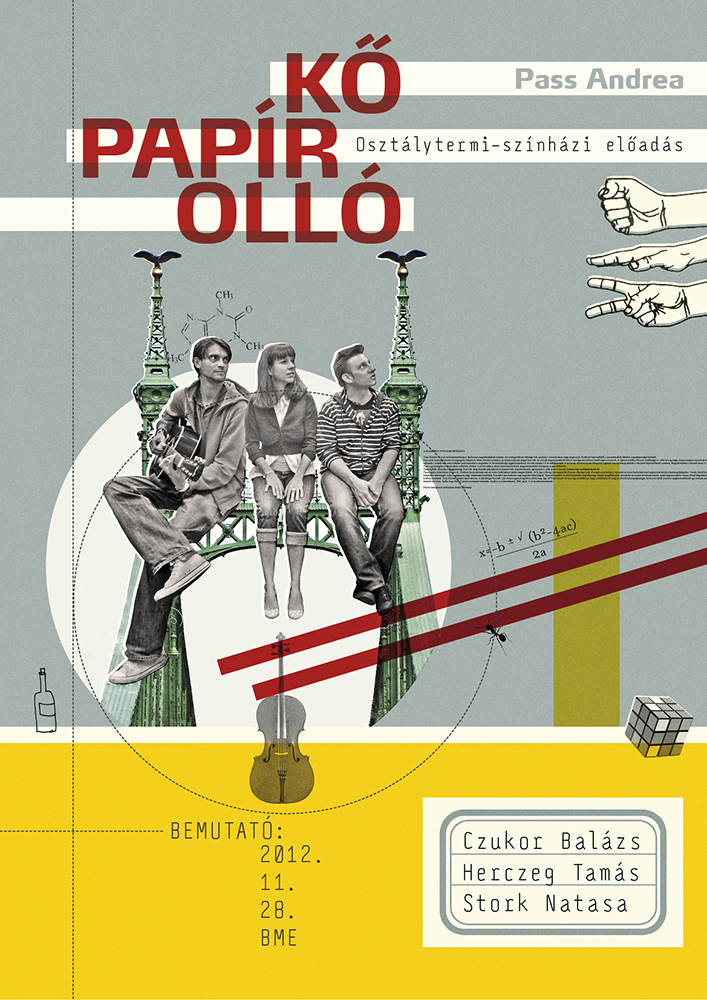
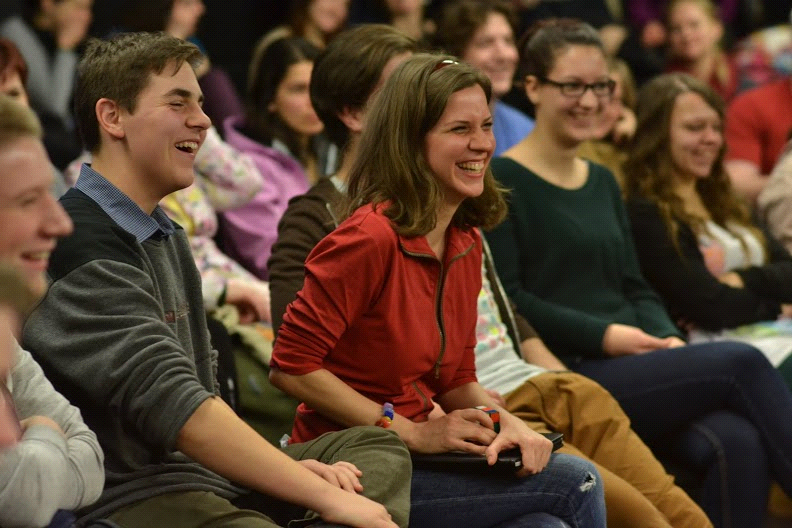
Excerpts from Reviews
Synopsis
Classroom Theatre Performance
The performance portrays the friendship of three high school students—Keri, Tomi, and Nati—and through it illustrates the process by which they gradually confront their unclear future and the roots of their anxieties as they approach career choices. Along the path of deciding on further education, they face numerous problems they have never discussed before. Anxiety is a familiar feeling for all three, yet none of them has a strategy to manage it. Their friendship surrounds them like a lifeline—until Tomi drops out. Throughout their story, they reach the moment when they must make a decision; it is at this point that the collaborative play with the participating students begins. The characters’ dilemmas are explored together, creating an opportunity for the students to reflect on themselves and their future through the experiences of the characters and actively engage in play.
(3 roles)
Keri
Tomi
Nati
The performance, including the drama workshop, lasts approximately 2 lessons (90 minutes).
Recommended age: 16+ years.
The play was published in the collection Plays by Andrea Pass (2021, Selinunte Publishing).
The production directed by Andrea Pass received support at the II and III Classroom Reviews, and was presented at the VII Kaposvár International ASSITEJ Children’s and Youth Theatre Biennale, in the OFF program of the 2014 Pécs National Theatre Meeting, at the XXVII Sándor Weöres National Children’s Theatre Festival in Debrecen, and at the KÁVA FORUM 14 professional symposium.
In 2019, the company of the National Theatre of Târgu Mureș launched its theatre education program using this play.
In 2023, the Pesti Magyar Színház staged the play, directed by Tamás Keresztény.


Excerpts from Reviews
Synopsis
Youth Drama
The play was inspired by a real-life incident. "Nothing else happened," says the girl whose chest was touched by Mr. Sipos after he kissed her.
Nothing else happened – said the initiated students in Mr. Sipos's camp, just part of a big game.
Nothing else happened – says Mr. Sipos, after abruptly leaving the school by mutual agreement to avoid scandal. Afterwards, nothing. "Afterwards, the soft tissue in my head healed over."
Nothing else happened because the parents stayed silent, the teachers stayed silent, the school stayed silent. And then nothing else happened – only nightmares, self-esteem issues, many years of psychoanalysis. Many have had, or still have, such a Mr. Sipos. "It's not a big deal."
Nothing else happened – until 25 years later, when a journalist finally wrote down what really happened.
Our protagonists are teenagers. Innocent, awkward, sometimes shy, sometimes bold, sometimes lonely, gangly kids. Awakening desires, first loves. They know more about the topic than the sexual education mini-play suggests, yet they are completely inexperienced. They get lost in the labyrinth of emotions, but they are willing to start over, slowly seeming to come closer to one another. Mr. Flórián, the teacher, is willing to help, for both girls and boys. What later happens in private with each favorite student, we do not see. So we can also say: nothing else happened.
Cast & Creative Team
5 Adult Roles and 8 Student Roles
Adults:
Flórián – teacher, physics and PE specialist
Kamilla H. Szabó – Viola’s mother
Hajnalka Mezei – Virág’s mother
Sándor Mezei – her husband, Virág’s father
Boglárka Laska – Bálint’s mother
Students:
Bence Fenyő
Gréta Garai
Jázmin Kardos
Áron Kende
Rozi Kiss
Bálint Laska
Virág Mezei
Viola Vogel
Lili Mandula Tóth
The creation of the play was supported dramaturgically by:
Judit Garai, Anna Hárs, and Anna Merényi
The play was published in Polish translation in the Warsaw Dialog magazine, 2017, and in the collection Pass Andrea’s Plays, Selinunte Publishing, 2021.
Production Photos
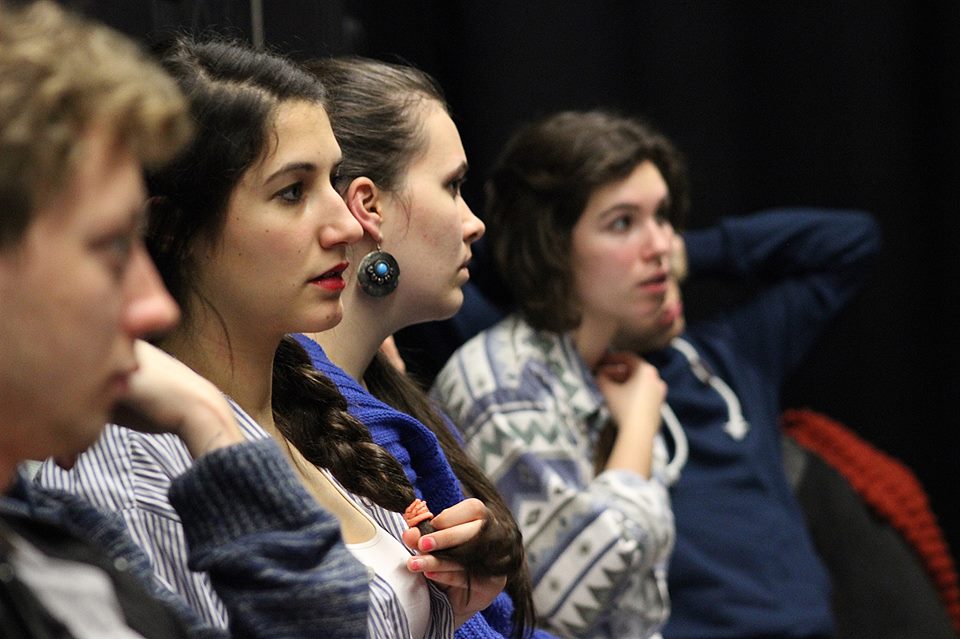
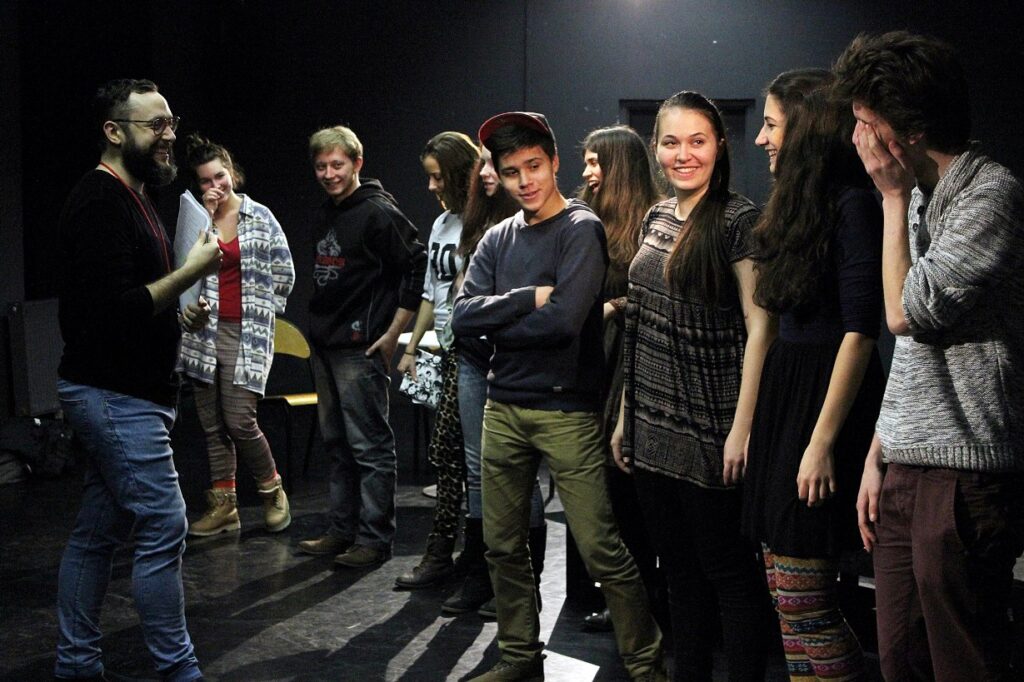
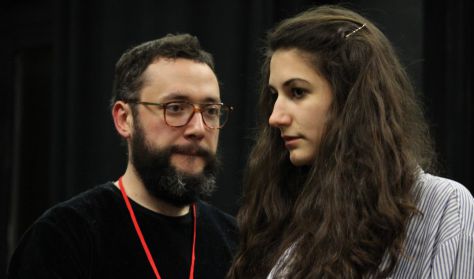
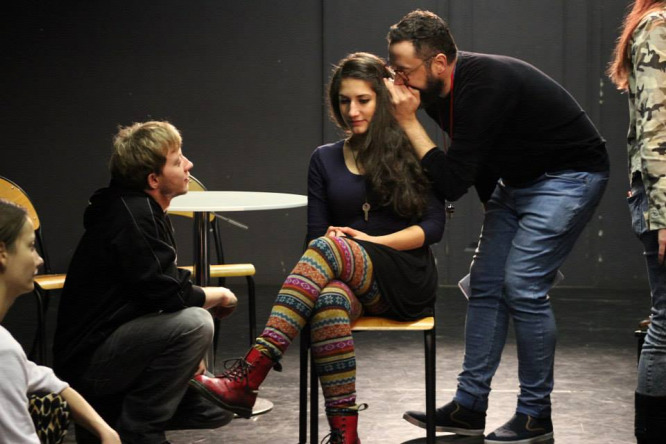
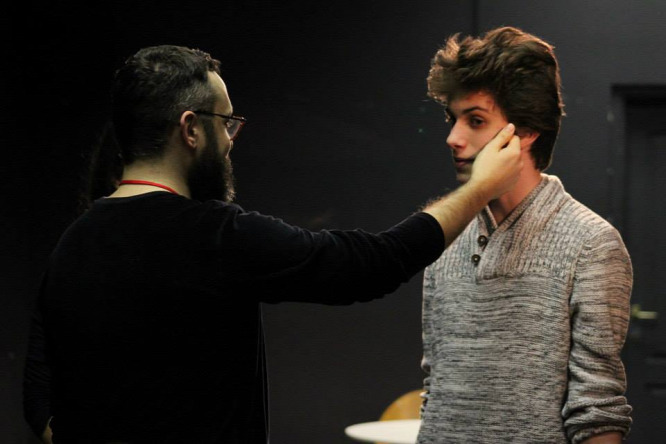
Excerpts from Reviews
Synopsis
Youth Performance
A joint production by Mentőcsónak Egység and FÜGE.
Our protagonist, Kata, a 16-year-old rebellious teenager, moves from her previously wealthy environment to a housing estate following her parents’ divorce, where the local youths initially seem hostile. It soon becomes clear that these seemingly intimidating kids are ready to help the fatherless girl in any situation. Three emotionally scarred young people, connected by fate, find each other. Together, they turn their grievances into uncontrollable anger and seek out its irrational targets. The fight against their perceived enemies escalates, employing increasingly harsh means, which even the parents seem unable to stop.
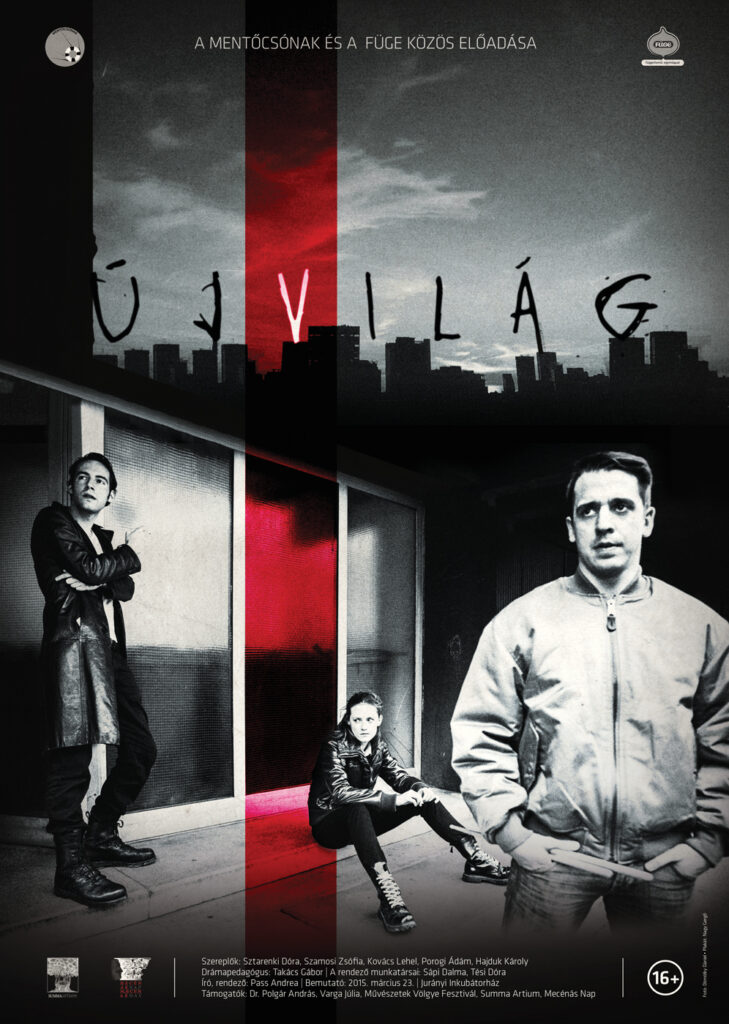
Cast & Creative Team
Roles:
Kata (16 years old)
Mother (Ági)
Father (Miklós)
Robi (18 years old)
Áron (20 years old)
Cast:
Dóra Sztarenki, Zsófia Szamosi, Lehel Kovács, Ádám Porogi, Károly Hajduk
Drama pedagogue: Gábor Takács
Director’s assistants: Dalma Sápi, Dóra Tési
Writer, director: Andrea Pass
Duration: 90 minutes (+ 45-minute discussion with our student audience)
The performance was selected into the artistic program of IETM and won the Grand Prize in the youth category at the 8th Children’s and Youth Theatre Showcase.
With this play, the Hungarian Ensemble of the Subotica Theatre launched its theatre education program in 2019. The Subotica production was selected for the competition program of the 10th Kaposvár International ASSITEJ Children’s and Youth Theatre Festival, where it received the Békés Pál Award, recognizing the best playwright.
Production Photos
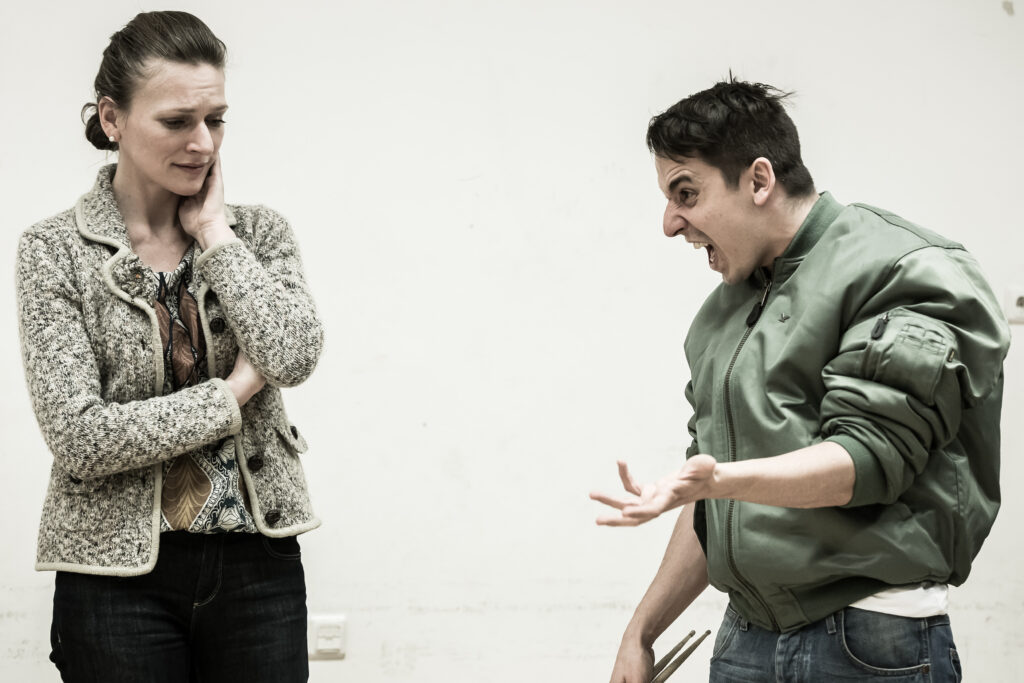

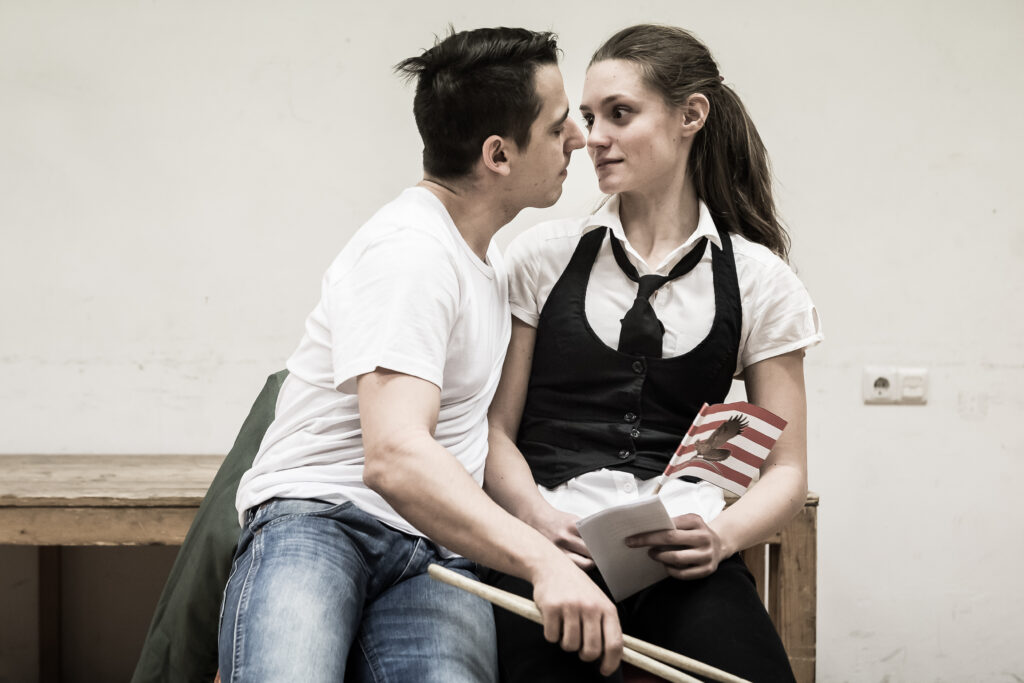
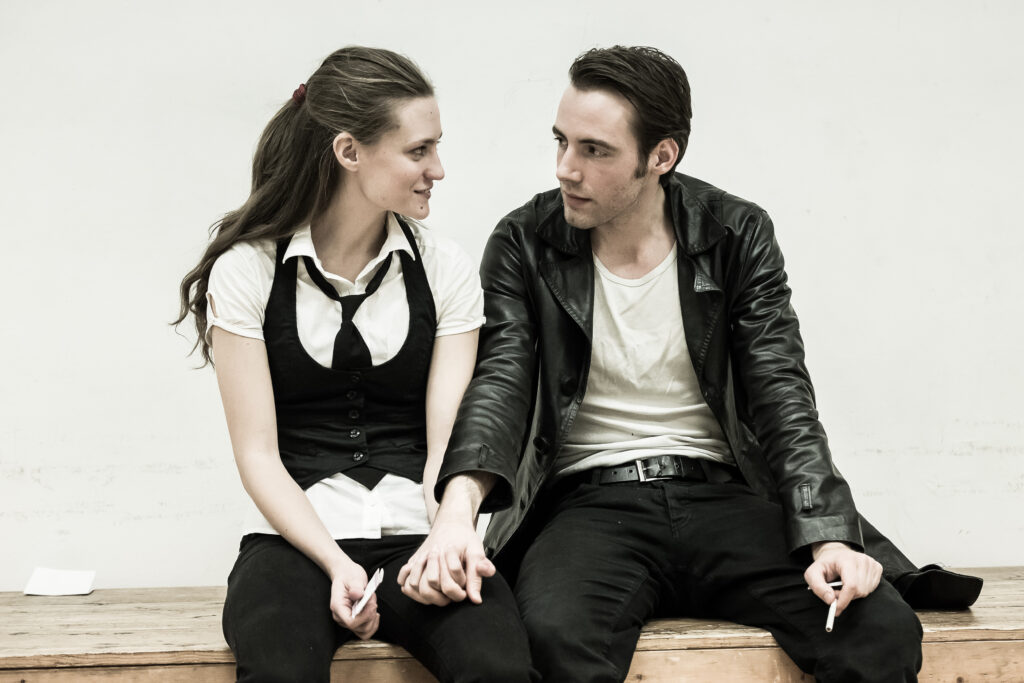
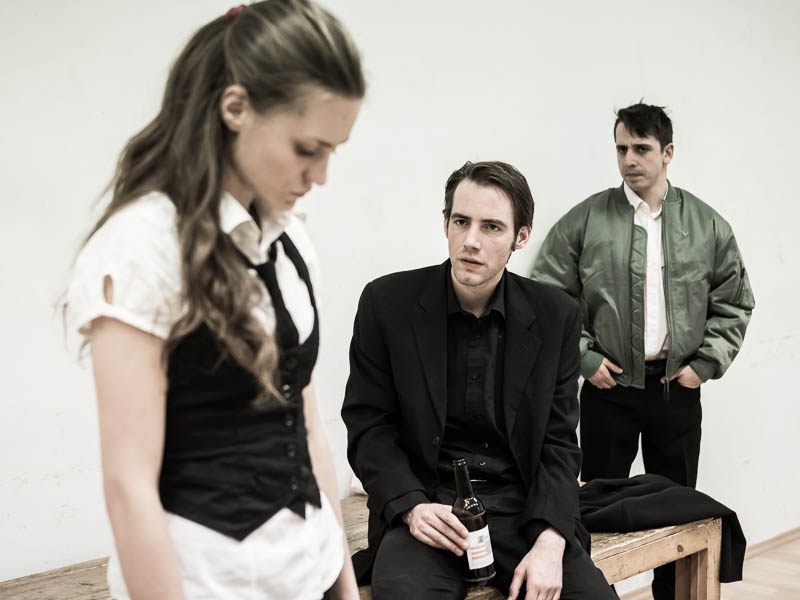
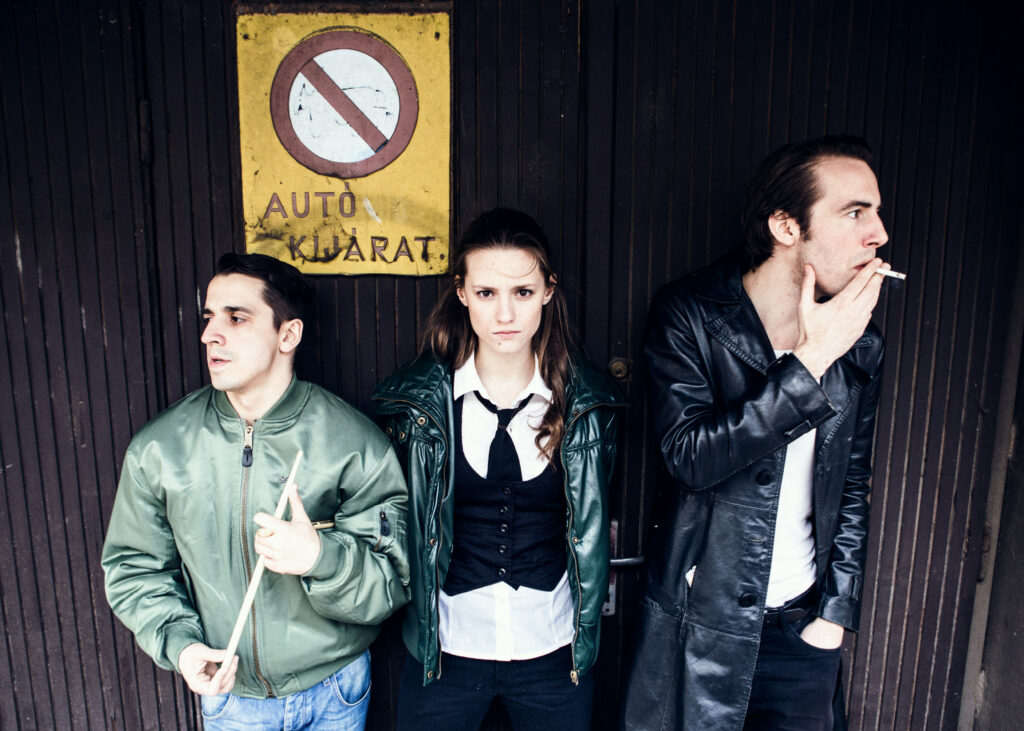
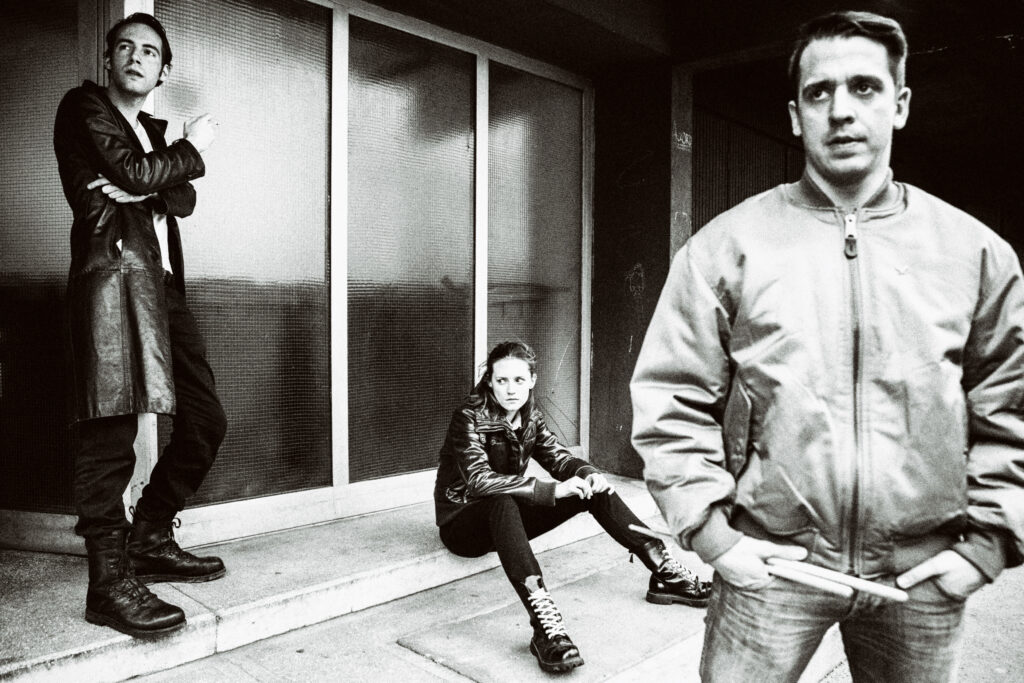
Photos by: Dániel Dömölky
Trailer
Excerpts from Reviews
Synopsis
Teen Transformation Story in 20 Scenes
Inspiration, text excerpts: Franz Kafka
Concept: Judit Garai, Andrea Pass
In biology, an imago is the fully developed, sexually mature winged stage of an insect. The imago is preceded by the larval stage. The larva is a transitional developmental form in animals that undergo metamorphosis. Kafka uses this interval when Gregor Samsa transforms from larval existence into an insect in The Metamorphosis, which also inspires the play Imágó.
Adolescents are in a formative stage: they grow a “shell,” undergo transformations, which is a characteristic of this age. Adolescence can be the most wonderful, yet also the most cursed period of life. Anxiety, fear, lack of self-confidence, self-loathing, depression, and its physical symptoms can mar the years essential for personality development. The teenager experiences this transformation with milder or more severe symptoms. They perceive differently, see differently, feel differently, grimace at family meals, prefer “fake” food, happily hide in dark places, and turn away from the comfort of home, gradually becoming a stranger to their familiar surroundings as they assume an increasingly “strange shape” for their family. The adolescent grows distant—but is this their alienation, or rather a reflection of their environment’s incomprehension?
The play Imágó is about teenagers for adults, and vice versa.
Cast & Creative Team
(15 roles, can be performed with as few as 9 actors)
Gregor Sámuel, Samu (17 years old)
Samu’s father, Gábor
Samu’s mother, Vera
Samu’s older sister, Klarissza (19 years old)
Samu’s younger sister, Lujza (11 years old)
Samu’s classmate, Boti (17 years old)
Teacher; Waiting Woman; Boti’s mother
Shop Assistant; Coach; Doctor
Girl in the tobacco shop; Girl in the gym storage (17 years old)
Dia (17 years old)
Production Photos
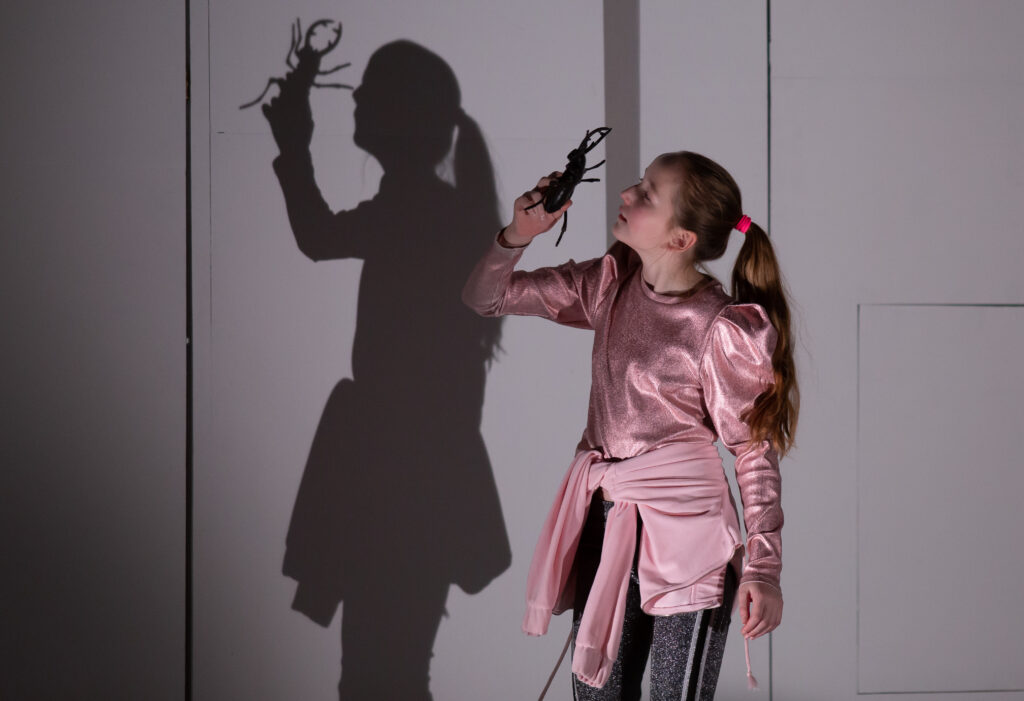
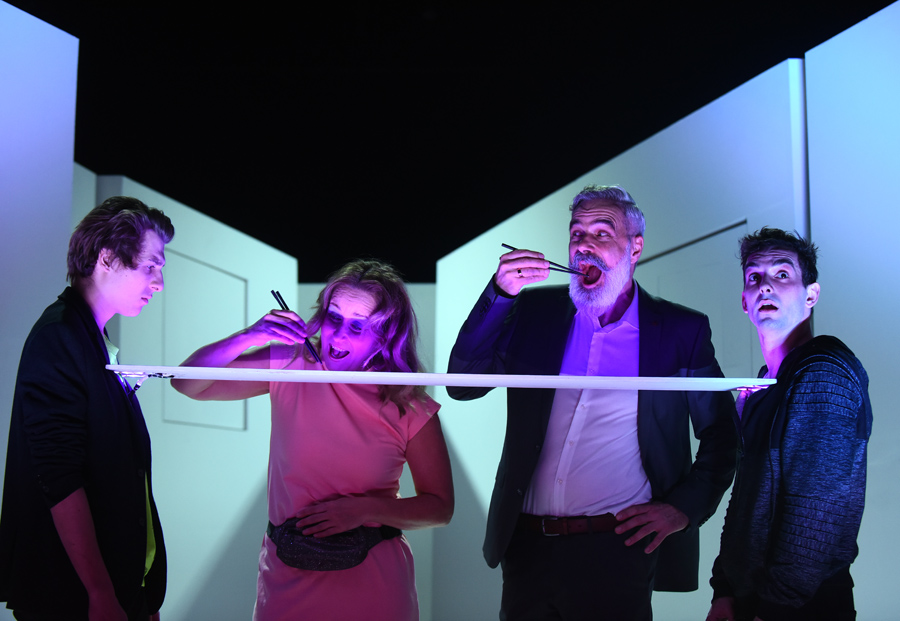
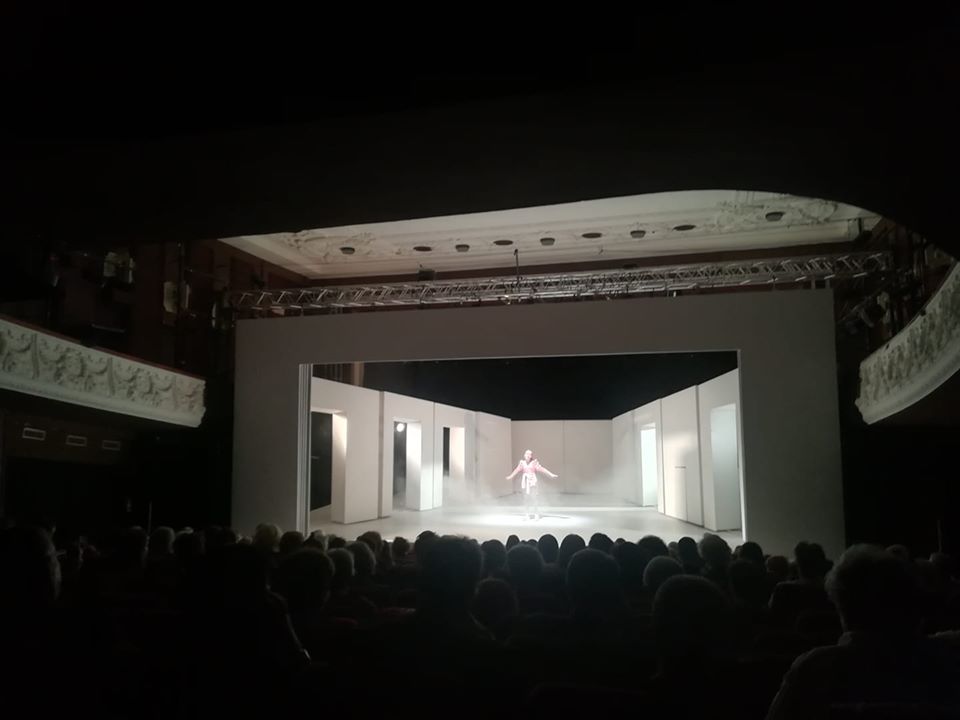
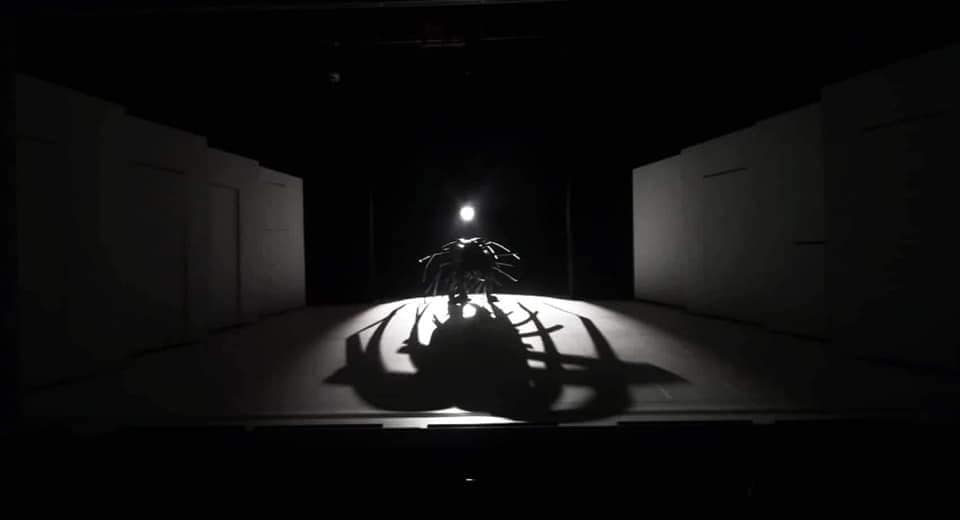
Photos by: András Máthé
Synopsis
Youth Performance
Generation Z Paradigm
“We are proud that the world is ours? And if it is ours, where do we take it next? How long can we carry it? If we drop it, will it shatter or bounce back like a rubber ball? But what can I do, here, alone, trapped in such a bubble?”
What does confinement, the loss of freedom, mean for young people whose lives were suddenly upended by the pandemic, erasing the coordinates they once took for granted? The authors of the play are themselves part of this generation—teenagers finishing high school or beginning university—whose lives were halted at perhaps the most important moment, yet who gained a wealth of emotional, psychological, and mental experience. During the writing process, the students dug ever deeper, at times venturing to chilling heights, sensitively reflecting the state of mind of their generation. Viewed from the present, the pandemic serves merely as a pretext, allowing the young people to open up: this is a worldview emerging along a new paradigm, with characters who respond with pain to social injustices and gestures that violate human dignity, watching over one another protectively, and carrying fragile fates. From these scenes, Pass Andrea crafted a staged production, with performers partly the authors themselves and partly actors actively involved in DanteCasino.
Foreword by Judit Garai to the published play:
“The multi-authored Hangosan lépek… (A Loud Step...) was premiered in 2021 at Három Holló in Budapest, and was performed until 2025 not only in the capital but elsewhere as well. Among the cast were young professional actors, as well as two members of the writers’ community who had created the play. Andrea Pass, the director of the performance, led a playwriting course for young people in 2018 at the invitation of the Színműhely Foundation and its then outstanding director, the late Mária Szilágyi. The course proved so fruitful that the group continued working together as a creative community, later on online, since the Covid restrictions only made this possible. The texts of the young participants were mentored and then edited by Pass, who throughout her diverse and exciting career as both writer and director has often demonstrated her pedagogical talent and sensitivity to collective creative processes. The texts of Bíborka Kiskos, Anna Gajda, László Nyári, Mátyás Papp, Boldizsár Romvári, Aliz Terecskei, Kata Tóth and Klarissza Tóth, thanks to this current online publication and the former stage premiere, already enter a dialogic, public space through which – as creators and partly as performers – they can make their voices heard and reflect on their own situations, realities, thoughts, and the world surrounding them.
Cast & Creative Team
Writers:
Bíborka Kiskos, Anna Gajda, László Nyári, Mátyás Papp, Boldizsár Romvári, Aliz Terecskei, Kata Tóth, Klarissza Tóth
Performed by:
Máté Dezső Georgita, Ágoston Kenéz, Máté Martinkovics, Anna Gajda, Rebeka Nagy, Mátyás Papp, Zsófia Tóth
Music: Márk Bartha
Costumes: Kata Pető
Video: Gábor Karcis
Assistant Director: Veronika Vajdai
Art Consultant, Production Manager: Mária Szilágyi
Compiled and Directed by: Andrea Pass
Poster Design: Kata Tóth
Photography: Aliz Győri
Special thanks to Szabolcs Hajdu and Telex.
The Telex video used was created by András Földes.
A production by SzínMűHely.
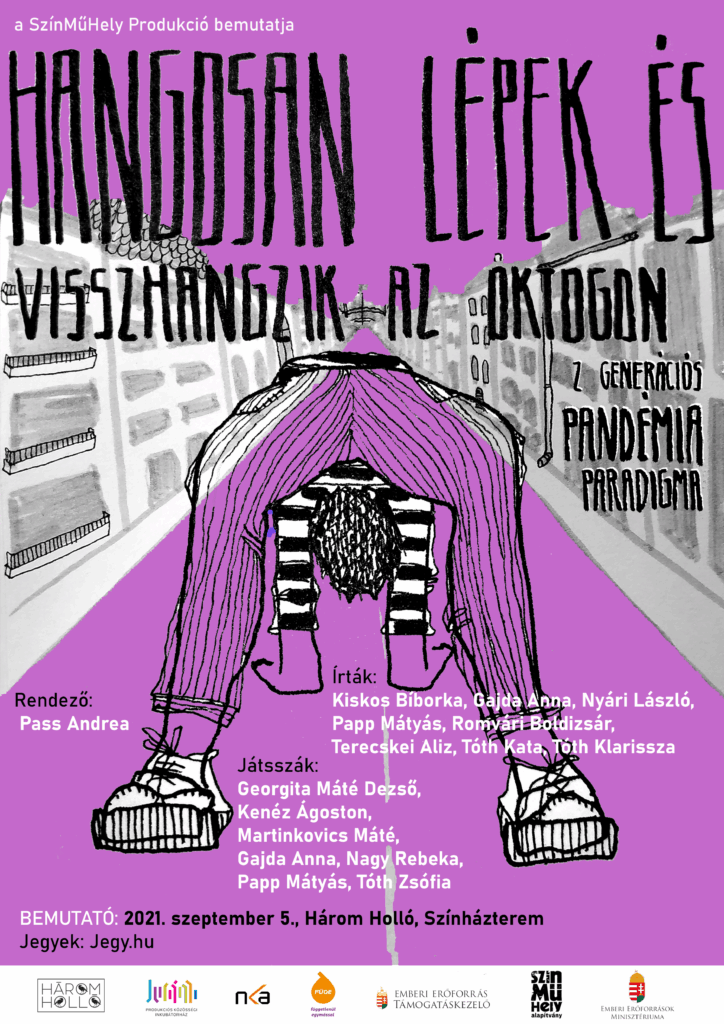
The above, arbitrarily chosen quotation vividly shows how problems or questions that at first might seem trivial or merely “generational” can expand into a crisis affecting society as a whole. Despite appearances, what we face here are not individual but systemic problems, which cannot be remedied by “healing” the individual but only by uncovering and transforming deeper structural causes. The concept of depressive hedonism, borrowed from the British cultural theorist Mark Fisher, is the essence of the play. The depiction of a group of high school seniors (characters named Milos, Gazsi, Hanna, Petra, Karcsi, Ottó, and Bori), forced into isolation by the pandemic, and through them the generations of their parents and teachers, as well as Hungarian society in its contemporary political, economic, and cultural context, condenses into one the lethargic state of human beings torn between depression and a compulsion to enjoy themselves. This is not only a byproduct of a global pandemic but, in a broader perspective, a condition inherent to the system of capitalism itself. We always want to provide everything for ourselves; we do not dare, do not want, or do not know how to be bored—and this makes our lives compulsive. We feel we must account for every minute, otherwise we are nobody. The recognition and perception of this alarming and thought-provoking situation unfold in countless moving and humorous variations throughout the play: sometimes in a monologue, sometimes in a nightmare recalling the literature graduation exam, sometimes in an illegal house party scene, or overheard in a love letter written by a boy forced to suppress his sexual orientation. Linguistically diverse, full of (pop)cultural and topical political references, and formally versatile, the work testifies both to the talent of the creative team and to the collective process through which an eight-member group of young writers, together with their mentor, created a text that serves simultaneously as a means of communication, a unique theatrical language, and a method for addressing communal issues. More such works should appear on Hungarian stages!
Production Photos
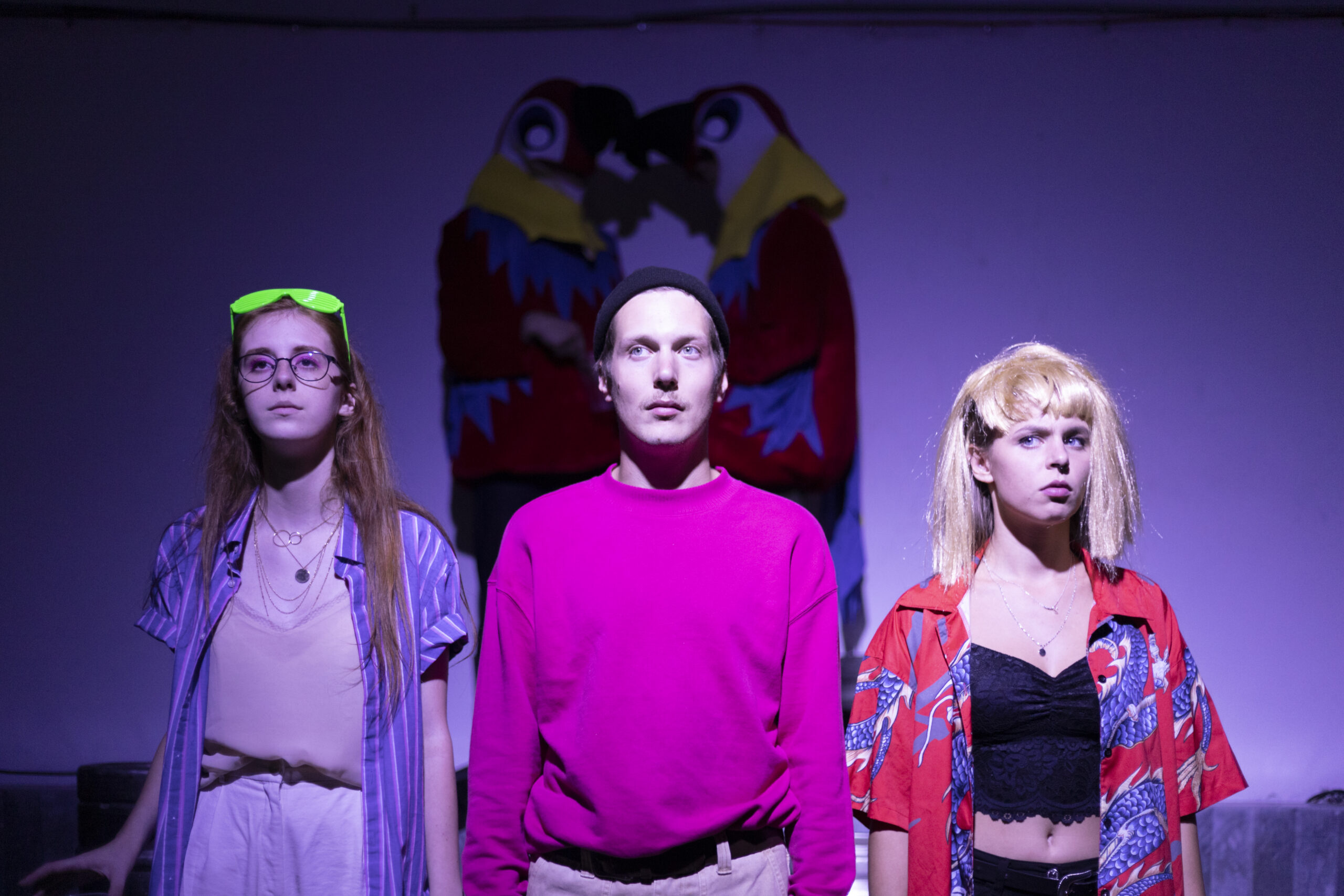
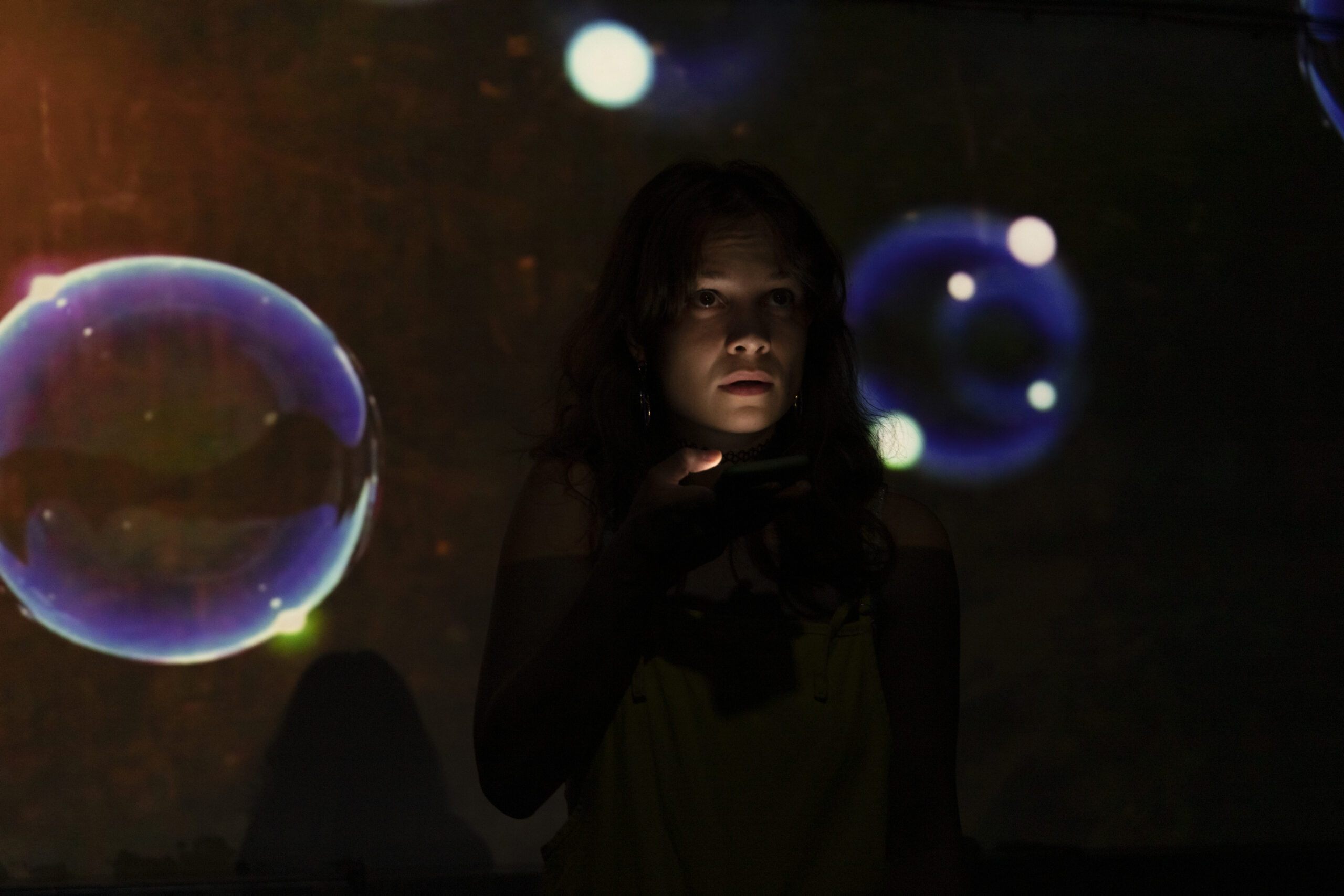
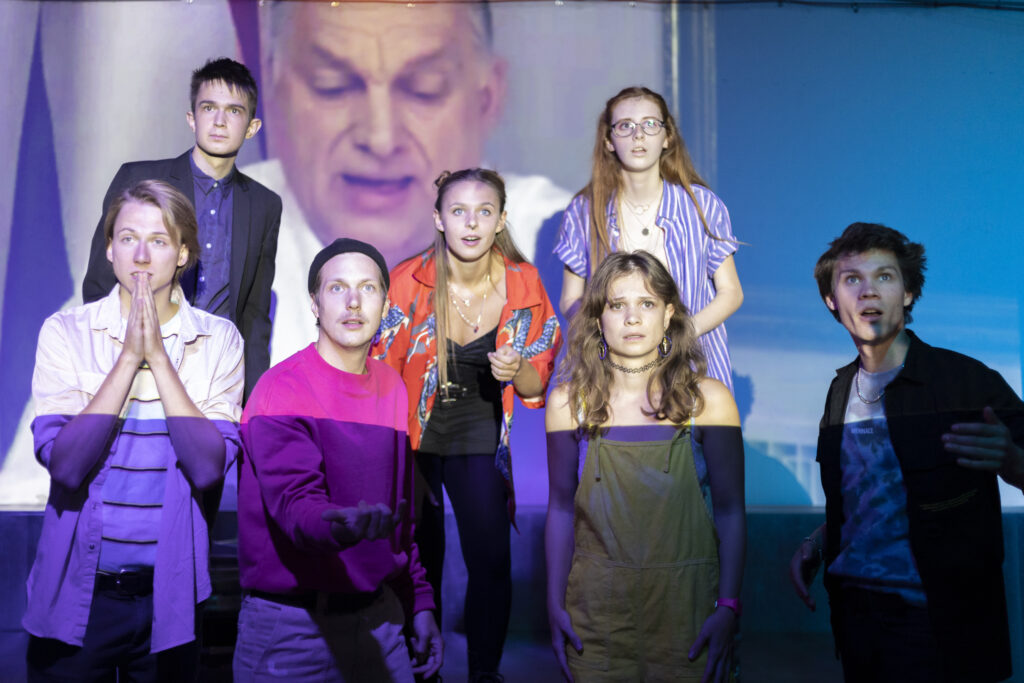
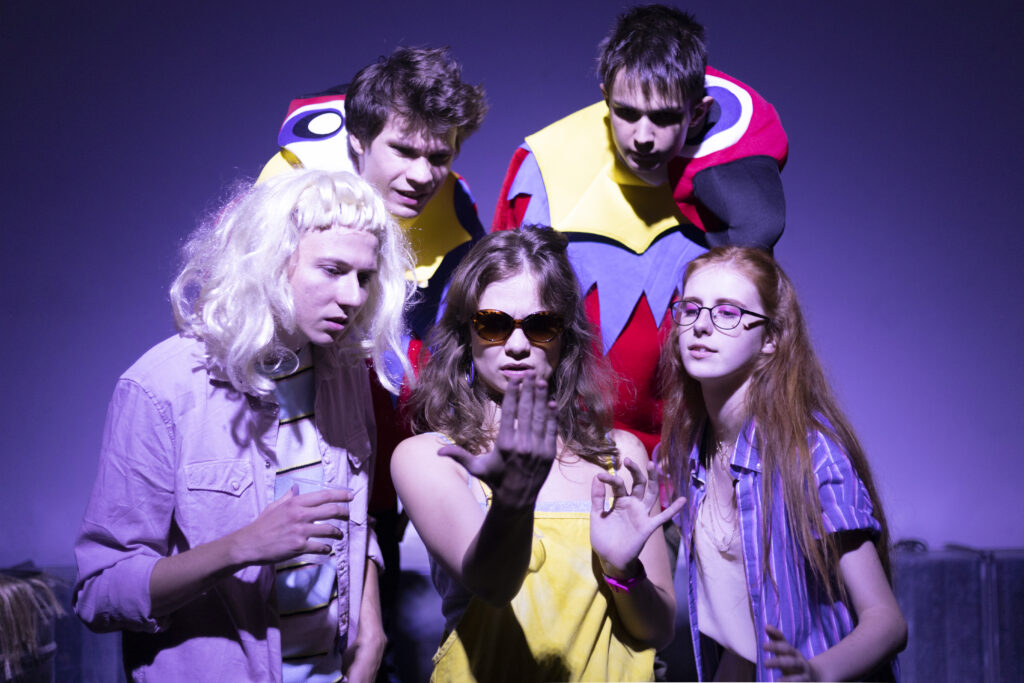
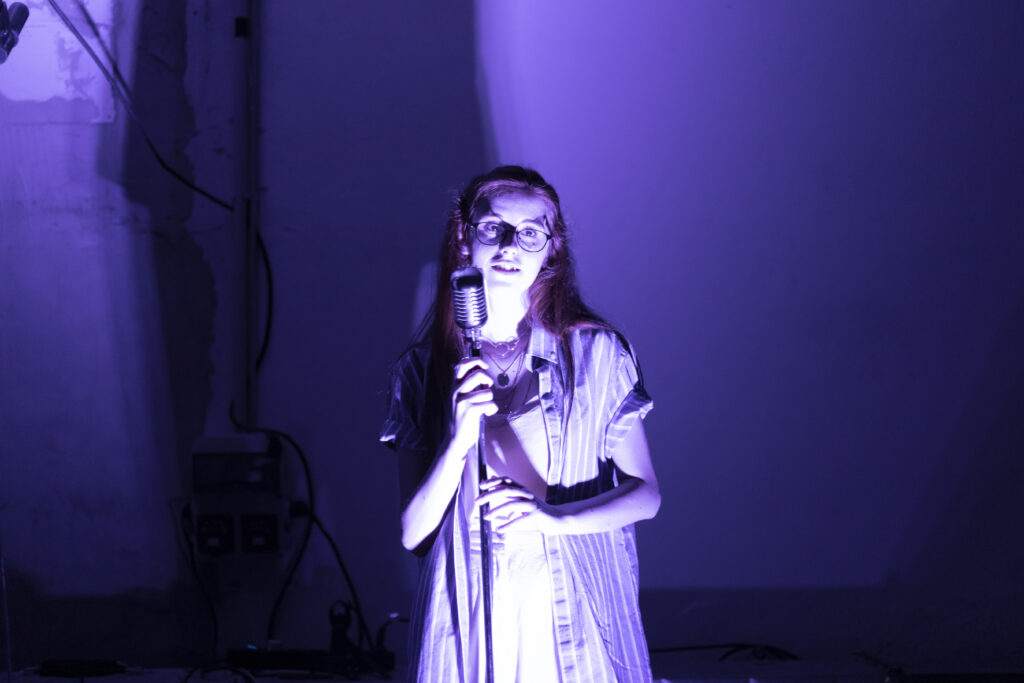
Photo by: Aliz Győri
Trailer
Excerpts from Reviews
Synopsis
Youth Drama
The play was inspired by a real-life incident. "Nothing else happened," says the girl whose chest was touched by Mr. Sipos after he kissed her.
Nothing else happened – said the initiated students in Mr. Sipos's camp, just part of a big game.
Nothing else happened – says Mr. Sipos, after abruptly leaving the school by mutual agreement to avoid scandal. Afterwards, nothing. "Afterwards, the soft tissue in my head healed over."
Nothing else happened because the parents stayed silent, the teachers stayed silent, the school stayed silent. And then nothing else happened – only nightmares, self-esteem issues, many years of psychoanalysis. Many have had, or still have, such a Mr. Sipos. "It's not a big deal."
Nothing else happened – until 25 years later, when a journalist finally wrote down what really happened.
Our protagonists are teenagers. Innocent, awkward, sometimes shy, sometimes bold, sometimes lonely, gangly kids. Awakening desires, first loves. They know more about the topic than the sexual education mini-play suggests, yet they are completely inexperienced. They get lost in the labyrinth of emotions, but they are willing to start over, slowly seeming to come closer to one another. Mr. Flórián, the teacher, is willing to help, for both girls and boys. What later happens in private with each favorite student, we do not see. So we can also say: nothing else happened.
Cast & Creative Team
5 Adult Roles and 8 Student Roles
Adults:
Flórián – teacher, physics and PE specialist
Kamilla H. Szabó – Viola’s mother
Hajnalka Mezei – Virág’s mother
Sándor Mezei – her husband, Virág’s father
Boglárka Laska – Bálint’s mother
Students:
Bence Fenyő
Gréta Garai
Jázmin Kardos
Áron Kende
Rozi Kiss
Bálint Laska
Virág Mezei
Viola Vogel
Lili Mandula Tóth
The creation of the play was supported dramaturgically by:
Judit Garai, Anna Hárs, and Anna Merényi
The play was published in Polish translation in the Warsaw Dialog magazine, 2017, and in the collection Pass Andrea’s Plays, Selinunte Publishing, 2021.
Production Photos





Excerpts from Reviews
Synopsis
Youth Performance
A joint production by Mentőcsónak Egység and FÜGE.
Our protagonist, Kata, a 16-year-old rebellious teenager, moves from her previously wealthy environment to a housing estate following her parents’ divorce, where the local youths initially seem hostile. It soon becomes clear that these seemingly intimidating kids are ready to help the fatherless girl in any situation. Three emotionally scarred young people, connected by fate, find each other. Together, they turn their grievances into uncontrollable anger and seek out its irrational targets. The fight against their perceived enemies escalates, employing increasingly harsh means, which even the parents seem unable to stop.

Cast & Creative Team
Roles:
Kata (16 years old)
Mother (Ági)
Father (Miklós)
Robi (18 years old)
Áron (20 years old)
Cast:
Dóra Sztarenki, Zsófia Szamosi, Lehel Kovács, Ádám Porogi, Károly Hajduk
Drama pedagogue: Gábor Takács
Director’s assistants: Dalma Sápi, Dóra Tési
Writer, director: Andrea Pass
Duration: 90 minutes (+ 45-minute discussion with our student audience)
The performance was selected into the artistic program of IETM and won the Grand Prize in the youth category at the 8th Children’s and Youth Theatre Showcase.
With this play, the Hungarian Ensemble of the Subotica Theatre launched its theatre education program in 2019. The Subotica production was selected for the competition program of the 10th Kaposvár International ASSITEJ Children’s and Youth Theatre Festival, where it received the Békés Pál Award, recognizing the best playwright.
Production Photos







Photos by: Dániel Dömölky
Trailer
Excerpts from Reviews
Synopsis
Teen Transformation Story in 20 Scenes
Inspiration, text excerpts: Franz Kafka
Concept: Judit Garai, Andrea Pass
In biology, an imago is the fully developed, sexually mature winged stage of an insect. The imago is preceded by the larval stage. The larva is a transitional developmental form in animals that undergo metamorphosis. Kafka uses this interval when Gregor Samsa transforms from larval existence into an insect in The Metamorphosis, which also inspires the play Imágó.
Adolescents are in a formative stage: they grow a “shell,” undergo transformations, which is a characteristic of this age. Adolescence can be the most wonderful, yet also the most cursed period of life. Anxiety, fear, lack of self-confidence, self-loathing, depression, and its physical symptoms can mar the years essential for personality development. The teenager experiences this transformation with milder or more severe symptoms. They perceive differently, see differently, feel differently, grimace at family meals, prefer “fake” food, happily hide in dark places, and turn away from the comfort of home, gradually becoming a stranger to their familiar surroundings as they assume an increasingly “strange shape” for their family. The adolescent grows distant—but is this their alienation, or rather a reflection of their environment’s incomprehension?
The play Imágó is about teenagers for adults, and vice versa.
Cast & Creative Team
(15 roles, can be performed with as few as 9 actors)
Gregor Sámuel, Samu (17 years old)
Samu’s father, Gábor
Samu’s mother, Vera
Samu’s older sister, Klarissza (19 years old)
Samu’s younger sister, Lujza (11 years old)
Samu’s classmate, Boti (17 years old)
Teacher; Waiting Woman; Boti’s mother
Shop Assistant; Coach; Doctor
Girl in the tobacco shop; Girl in the gym storage (17 years old)
Dia (17 years old)
Production Photos




Photos by: András Máthé
Synopsis
Youth Performance
Generation Z Paradigm
“We are proud that the world is ours? And if it is ours, where do we take it next? How long can we carry it? If we drop it, will it shatter or bounce back like a rubber ball? But what can I do, here, alone, trapped in such a bubble?”
What does confinement, the loss of freedom, mean for young people whose lives were suddenly upended by the pandemic, erasing the coordinates they once took for granted? The authors of the play are themselves part of this generation—teenagers finishing high school or beginning university—whose lives were halted at perhaps the most important moment, yet who gained a wealth of emotional, psychological, and mental experience. During the writing process, the students dug ever deeper, at times venturing to chilling heights, sensitively reflecting the state of mind of their generation. Viewed from the present, the pandemic serves merely as a pretext, allowing the young people to open up: this is a worldview emerging along a new paradigm, with characters who respond with pain to social injustices and gestures that violate human dignity, watching over one another protectively, and carrying fragile fates. From these scenes, Pass Andrea crafted a staged production, with performers partly the authors themselves and partly actors actively involved in DanteCasino.

Cast & Creative Team
Writers:
Bíborka Kiskos, Anna Gajda, László Nyári, Mátyás Papp, Boldizsár Romvári, Aliz Terecskei, Kata Tóth, Klarissza Tóth
Performed by:
Máté Dezső Georgita, Ágoston Kenéz, Máté Martinkovics, Anna Gajda, Rebeka Nagy, Mátyás Papp, Zsófia Tóth
Music: Márk Bartha
Costumes: Kata Pető
Video: Gábor Karcis
Assistant Director: Veronika Vajdai
Art Consultant, Production Manager: Mária Szilágyi
Compiled and Directed by: Andrea Pass
Poster Design: Kata Tóth
Photography: Aliz Győri
Special thanks to Szabolcs Hajdu and Telex.
The Telex video used was created by András Földes.
A production by SzínMűHely.
Foreword by Judit Garai for the published play:
“The multi-author Hangosan lépek… was premiered in 2021 at Három Holló in Budapest and continued to be performed until 2025, not only in the capital but elsewhere as well. Among the cast were young professional actors, and two were drawn from the group of writers who contributed to the play. Andrea Pass, the director of the production, conducted a playwriting course for young people in 2018 at the request of the SzínMűHely Foundation and its then-excellent director, the late Mária Szilágyi. The course proved so fruitful that the team continued working as a creative collective, although later online due to COVID-19 restrictions. Pass mentored and edited the texts written by the participating young people, drawing on her extensive and highly exciting career as a writer-director, which has repeatedly demonstrated her pedagogical sensitivity and her awareness of collective creative processes.
The texts by Bíborka Kiskos, Anna Gajda, László Nyári, Mátyás Papp, Boldizsár Romvári, Aliz Terecskei, Kata Tóth, and Klarissza Tóth now enter a dialogical, public space thanks to this online publication and the original theatrical premiere. Through this platform, as creators and partly as performers, they can express their voices and reflect on their own life situations, realities, thoughts, and the world around them. The excerpt above illustrates how issues and questions that may initially seem “generational” can expand into a crisis affecting society as a whole. Contrary to appearances, we are dealing not with individual problems but with systemic issues that can only be addressed by uncovering and changing their deeper structural causes rather than “healing” the individual.
The play’s essence can be captured through the concept of depressive hedonia borrowed from the British cultural theorist Mark Fisher. It portrays a group of young people (Milos, Gazsi, Hanna, Petra, Karcsi, Ottó, and Bori), forced into isolation before their final exams due to the pandemic, and, through them, their parents’ and teachers’ generations, as well as contemporary Hungarian society in its political, economic, and cultural context. This extraordinary crisis setting condenses the lethargic condition of humans tormented by depression and the compulsion to entertain themselves—a state not unique to a pandemic but characteristic of the capitalist system at large. We always want to give ourselves everything, yet we are unable, unwilling, or afraid to be bored, which turns our lives into a constant compulsion. We feel that every minute must be scheduled; otherwise, we are nothing.
This alarming and thought-provoking situation is explored in the play in numerous moving and humorous variations: in monologues, nightmare sequences evoking literature exams, illegal house party scenes, or through overheard love letters of a boy forced to suppress his sexual orientation. The linguistically diverse work is filled with (pop) cultural and current political references and formally varied, showcasing the talent of the creative team. It also reflects the collective, collaborative process whereby an eight-member team of young writers, together with their mentor, produced a text that serves as a means of communication, a unique theatrical language, and a method for addressing community issues. Hungarian stages deserve more works like this!”
Production Photos




